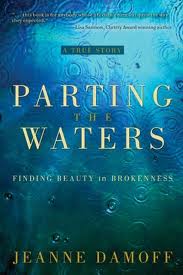 How do you write a story like Jeanne Damoff’s Parting the Waters: Finding Beauty in Brokenness?
How do you write a story like Jeanne Damoff’s Parting the Waters: Finding Beauty in Brokenness? With a lot of pain, joy, heartache, anger, love; most of all, love.
How do you read a story like Parting the Waters?
With a lot of pain, joy, heartache, anger and, yes, love. As you read it, you forget how well and beautifully written it is because the story this mother tells is that compelling.
We all know what being under water for at least 10 minutes means: brain damage. And that’s what it meant for Jacob. But no one would know how extensive until he awoke from a coma.
In the meantime, what did his parents hear?
“His brain is dying.”
“I have to tell you of all the options,” which included removing his feeding tube.
“At best he’ll be a vegetable the rest of his life.”
In Parting the Waters, Jeanne Damoff tells a story you read with tears and often in tears. And you ultimately read it with joy and a sense of wonder at the sheer tenacity of life.
It would trite but true to say that the Damoffs clung to their faith in God. But cling they did, even as they questioned and fought and doubted, even when the answer was often a silence, especially for the question of why.
Damoff walks the reader through those months and years of prayer, choices, decisions and agonies, along with the triumphs and successes and joys. And you do rejoice when Jacob takes his first steps, when he says his first word, when he wants to see his bedroom again, when he remembers things that should have been wiped away.
Damoff also introduces the hundreds of people who rallied around her family and stayed rallied – long-time friends, close relatives, doctors, nurses, therapists, Jacob’s classmates, and the people of their hometown of Marshall, Texas, sometimes total strangers. Many, many people were involved in this miracle named Jacob Damoff. His story is an affirmation of life, love and the human brokenness we all share.
I’ve never met Jeanne and George Damoff and their family, but if I asked them how they managed to survive, manage and overcome what happened to their family, I expect they would say something like, “We didn’t.”
Related:
Jacob’s Blessing, a poem.
I didn't know she'd written a book - this looks so compelling. Thanks for the review, Glynn.
ReplyDeleteThis is so extraordinary and moving a story. . . and rare. Also a mystery, excerpt perhaps to say that Jacob wanted to live so much.
ReplyDeleteI put this title on my list after reading your poem. I think now I'll move it up in priority.
faith, fiction, nonfiction, friends.
ReplyDeletewhat a hard yet beautiful story this must be.
and to be told the true story by jacob's mother from her own experience...what an amazing love.
I have wanted to read this one since I visited her blog months ago. Even more so now, Glynn. It's on the list.
ReplyDeleteYeah! It's on my priority list too! I think though I'll save it for my Barbados adventure -- something special to read in a special place.
ReplyDeleteWhen we think we can't, God can.
ReplyDeleteOn my list now, too.
"Amazing love, how can it be?" Another one for my Amazon wish list pile.
ReplyDeleteThe poem, this post -- your tender heart toward Jacob and our story touches me deeply. How kind of our merciful God to take brokenness and fill it with His presence in such a way that it pulses through the veins of His body, making us one, teaching us how to love each other.
ReplyDeleteThank you, Glynn. You bless me. Much more than you can possibly know.
Thanks, Glynn. Sounds like a most remarkable book. And so much for us as we hear their story. I'll have to make note of it. And hopefully read it soon.
ReplyDelete